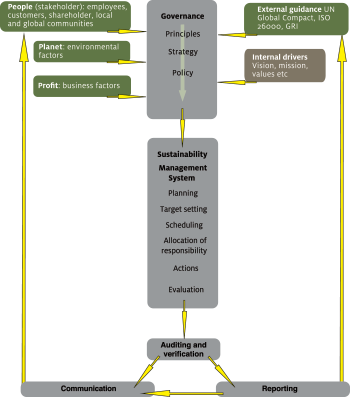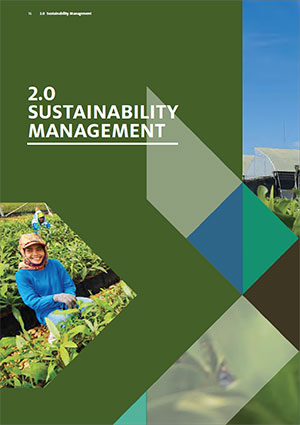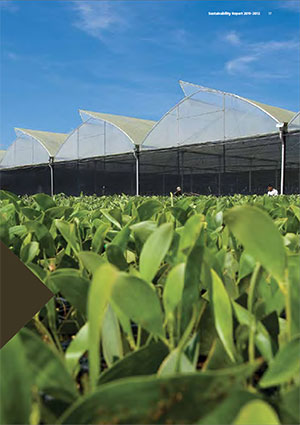The schematic below represents APRIL Indonesia’s Sustainability Management System. It shows how our systems, which are driven by our key governing bodies, are open, dynamic and responsive.
Figure 5: April Sustainability Management System The principles that guide our governing bodies and the sustainability strategies and policies these bodies create reflect both internal values and external factors. These factors include recognizing triple bottom line concerns, direct stakeholder influence and the guidance of elements such as the United Nations Global Compact, ISO 26000 Social Responsibility Guidance and the Global Reporting Initiative.
The principles that guide our governing bodies and the sustainability strategies and policies these bodies create reflect both internal values and external factors. These factors include recognizing triple bottom line concerns, direct stakeholder influence and the guidance of elements such as the United Nations Global Compact, ISO 26000 Social Responsibility Guidance and the Global Reporting Initiative.
Sustainability policy is enacted through our Sustainability Management System. Implementation is achieved through processes and procedures that cover planning and target setting, allocation of responsibilities, taking actions, assessing effectiveness and implementing corrections and improvements. Where necessary, auditing tools are applied to help build a culture of continuous improvement.
Through a cyclic process of reporting and communication, we inform and educate our stakeholders and guiding bodies about our work in developing and improving sustainable practices. Much of the information that forms the base of our communications with stakeholders is externally reviewed and assessed, thereby ensuring objectivity and transparency. This process is informed by the messages that stakeholders convey to APRIL.
APRIL maintains an Integrated Management System (IMS) that is certified to ISO9001, ISO14001, and OHSAS18001 standards. These voluntary, third party-certified processes cover our quality management, environmental and health and safety systems, respectively.
We undertake annual surveillance audits for ISO9001, ISO14001 and OHSAS18001, while internal audits for both the plantation and mill complex are based on an internal audit schedule. This is in addition to Chain of Custody audits that are completed for the wood supplied to the mill.
Reports as required under Indonesian law for environmental monitoring are submitted at six monthly intervals.
APRIL achieved ISO14001 certification for its forest operations in 2001, and for mill operations in 2003. We achieved OHSAS18001 for forest operations in 2005 and mill operations in 2006.
Current ISO14001 Certifications:
- APRIL’s Riau Complex, Certificate no. ID08/1181 valid from 18 November 2008 to 14 November 2014, subject to satisfactory surveillance audits, Certified by SGS
- Riaufibre (Certificate No. ID01/1179, valid from 14 November 2008 to 14 November 2014, subject to satisfactory surveillance audit), certified by SGS.
Current OHSAS18001 Certifications:
- APRIL’s Riau Complex to OHSAS18001, valid from 14 November 2008 to 14 November 2014, subject to satisfactory surveillance audits. Certificate ID08/1180
- APRIL’s Riaufibre to OHSAS18001, valid from 14 November 2008 to 14 November 2014, subject to satisfactory surveillance audits. Certificate ID08/1182.
The audit report for the latest surveillance audit for Riau Fibre, covering ISO14001 and OHSAS18001, was undertaken on 5 October 2012.
The audit report for the latest surveillance audit for Riau Complex, covering ISO14001, OHSAS18001 and ISO9001 was undertaken on 28 September 2012.
In meeting these standards, important components are: (i) regular updating of legal and other requirements to ensure these are recognised and incorporated into operations, (ii) a requirement to prevent pollution, work incidents and work related illness and (iii) a requirement for continuous improvement.
APRIL has also adopted other best practice voluntary standards and guidelines including the United Nations Food and Agriculture Organization (FAO) Fire Management Guidelines.
Communications
Transparent reporting and communication is key to building strong stakeholder relationships. It is also important in the evolution of our sustainability strategy.
Our Environmental, Health and Safety, Chain of Custody policy states our commitment to providing stakeholders with information that is understandable, adequately explains issues, and presents an accurate and verifiable representation of the Company’s integrated Environment, Health and Safety and Chain of Custody management systems and its performance in these areas. We are committed to ensuring this policy is communicated, understood by our employees and available to interested parties, including suppliers and customers.
Reporting
APRIL has engaged in Sustainability Reporting since 2002, producing one report biennially, in addition to updates between reports. These are available to the public via our company website.
Our Sustainability Reporting format follows the Global Reporting Initiative (GRI) framework. This widely used framework sets out the principles, indicators and other disclosures that organizations can use to measure and report their economic, environmental, and social performance. In preparing this 2011-2012 Sustainability Report, APRIL followed version 3.1 of the GRI guidelines. A new set of guidelines (GRI 4) came into effect toward the end of the process of assembling this report. It was therefore not feasible to follow the new guidelines.
In general, the data reported in this Sustainability Report covers the calendar years 2011 and 2012 (the “reporting period”). In various cases where the company has previously reported information for the 2008-10 period, data sets have been extended to cover the five-year period 2008-2012. In a number of cases, updates of key pieces of information have been provided at 30 June, 2013.
Our public reporting addresses land areas which are directly linked to APRIL Indonesia value chains. It is not APRIL’s practice to disclose detailed data pertaining to its supply partners, who supply wood fibre to APRIL under long-term supply arrangements. Supply partners are independent companies with their own Boards of Directors and governance arrangements, subject to their own disclosure obligations.
A comprehensive index describing GRI disclosures, referenced to specific pages is set out in section 7.2 of this Report. Within the GRI 3.1 reporting framework, there are three application levels (A, B and C) against which companies can report. This report is aimed at B+ level. This requires that our report include disclosures from this framework we have defined as relevant to our stakeholders and our operations. The plus (+) symbol indicates that an external third party has verified this Report.
Our Sustainability Reports are third party reviewed. This 2011-2012 Sustainability Report has been by Ernst and Young, Singapore. The Assurance Statement appears in section 7.1 of this Report.
While other interim updates are provided via the company website at www.aprilasia.com, APRIL’s Sustainability Reports provide an integrated presentation and review of many areas of our operations.
It should also be noted that many other disclosures made in this Report have been subject to various forms of independent third party review. For example, over the reporting period, Bureau Veritas has extensively audited APRIL’s forest management practices for the purpose of Origins and Legality of Timber certification and a range of other auditors have reviewed operations for the purposes of additional certifications referenced in this section and in Section 4.10 of this Report. In addition, during the first half of 2013, High Conservation Value assessments for the Pulau Padang concession have been expert-reviewed and subject to further independent review (see section 4.8).

